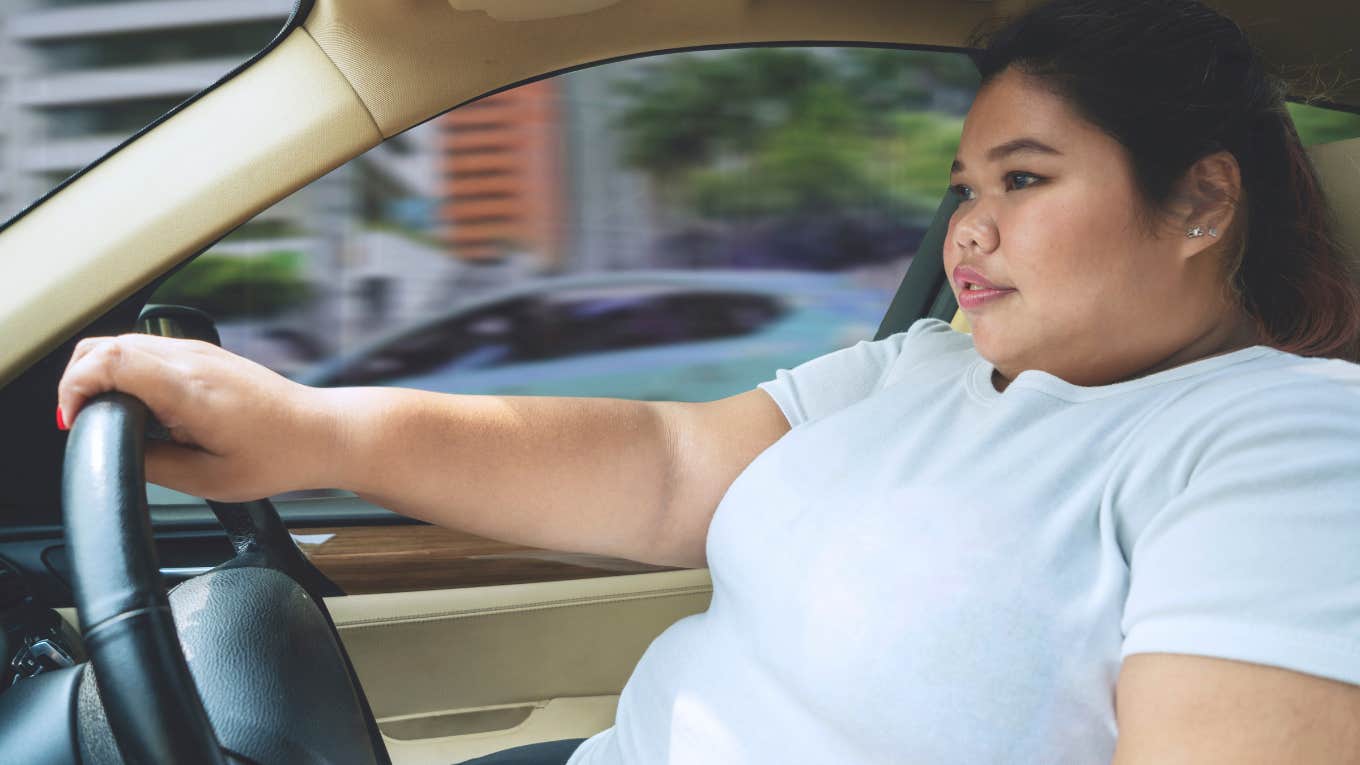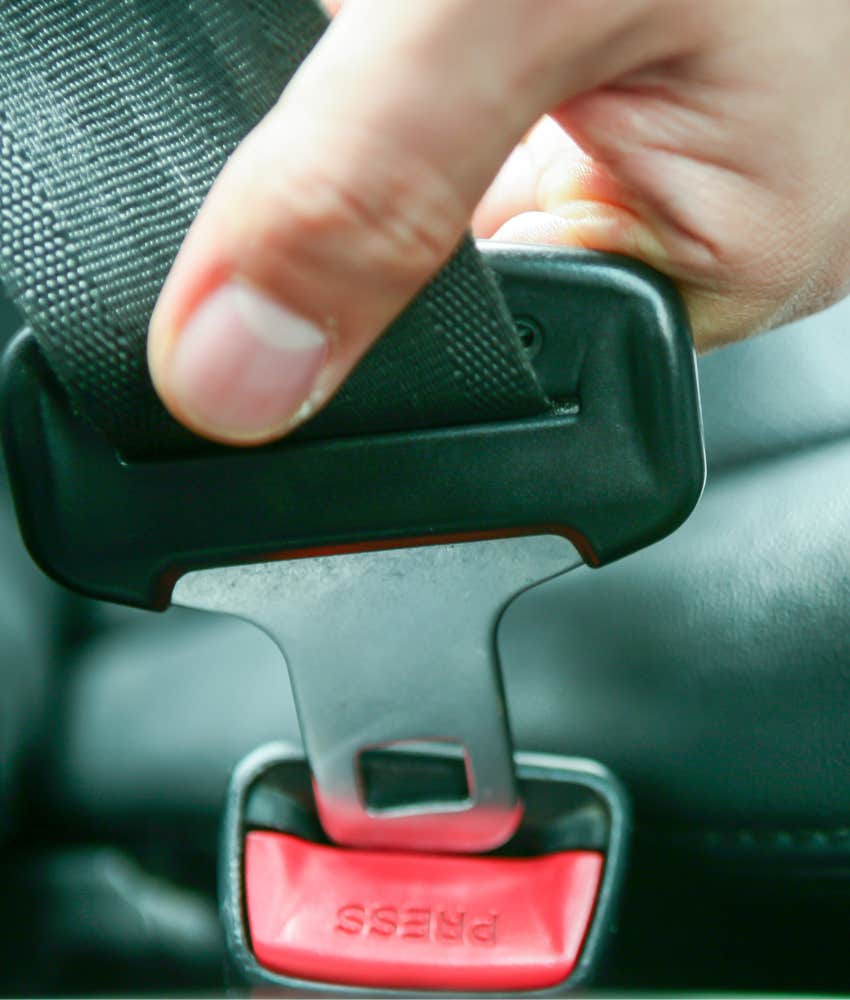Man Asks If It's Wrong To Refuse To Drive Until His 'Overweight' Friend Buckles Her Seatbelt, Even Though It's Hard For Her
The incident left her embarrassed and hurt. But did he do the right thing?
 Creativa Images / Canva Pro
Creativa Images / Canva Pro The more culturally open we become about the issues fat people face, the more it becomes clear how many basic things in our lives just aren't designed to accommodate them — including many that endanger their very safety.
A man on Reddit encountered this on a recent outing with a fat friend when she struggled to buckle her seatbelt. This opened up an illuminating conversation about a rather serious issue.
(Note: many activists and advocates say the term "fat" is preferred over terms like "overweight" or "obese," and we will be using the term throughout for this reason unless quoting the Redditor's own words.)
The man wondered if he was wrong for forcing his 'overweight' friend to buckle her seatbelt.
The situation definitely presents a dilemma: Should he spare his friend's feelings or defer to not only safety but, in many places, the law? Navigating this conundrum left both parties feeling uncomfortable.
 gunsan gimbanjang | Shutterstock
gunsan gimbanjang | Shutterstock
Their outing started out normally enough. They went to a movie, then ended the night at a local diner for a bite to eat. But when it came time to drive home, they ran into a problem.
"I buckled up and noticed she was having trouble," the man wrote in his post. "She couldn't get the seatbelt to click into the seat, and I even tried to help her."
She couldn't get the seatbelt buckled and insisted he drive off, but he refused to move until her belt was fastened.
Obviously, this would be an uncomfortable situation for most people, no matter how accustomed they are to dealing with these kinds of issues, and his friend was no exception. As he struggled to buckle her seatbelt, she began insisting he stop and drive off.
"She was heavily embarrassed," he wrote. But he refused to drive until she was safely buckled in. "I was insisting that I was not going to leave until she buckled. It was not safe, and I didn't feel comfortable," he wrote.
He was ultimately able to get the belt buckled, and his number-one concern was simply that they were both safe. But he felt horrible for "making her go through that embarrassment," and it was obvious his friend was upset by the situation.
"I tried to assure her that it was okay and that she didn't have to be embarrassed, trying to make her feel better, but she was brushing it off," he wrote. "We ended the night awkwardly, and I felt really bad."
People on Reddit felt he did the right thing, but this situation highlights the ways fat people are often put in danger.
As uncomfortable as it may have made his friend, it's hard to argue that he didn't do the right thing. Driving without seatbelts fastened is against the law in many states and often opens the driver to legal ramifications like fines and license points, whether they're the ones not wearing a belt or not.
But of far more concern to many others were the safety ramifications. They are actually even more dire for fat people because of the way seatbelts are designed.
As many fat activists have shared online, seatbelts need to be worn around the hip bones in order to work properly. But fat people's larger abdomens mean their belts often naturally fall across their stomachs, and in a crash that sends the belt jabbing into their internal organs, which is incredibly dangerous and potentially fatal.
It is a testament to the ways fatphobia permeates our culture and society that this is the case—since we generally view being fat as a character flaw that is no one's problem but the fat person's own, little thought has been put into making sure the design of our spaces and devices take fat bodies into account.
A seatbelt is a perfect example of how bizarre and cruel this is. It's a device designed to keep people from dying. Shouldn't it be able to save the lives of any and all bodies that can fit inside a car—thin, plus-size, or otherwise?
Instead, the general consensus seems to be a shrug and say, "Oh well, you get what you deserve for being fat in the first place." That's not only dehumanizing but also not a scientifically accurate view of what being fat is or of how it actually works biologically.
Until the culture changes, however, many suggested this guy, and all of us, get a seatbelt extender to just toss in the glove box for situations like this. It's important to ensure, however, that you do research into the safety ratings of any extenders you buy. (That goes for buying airplane seatbelt extenders too, which are often not up to FAA standards.)
It's wildly unfair that this man's friend had to be embarrassed like this, but in the end, he did the right thing both for himself and her. Hopefully, one day, designs of things like seatbelts will catch up with the need to protect all bodies, not just the ones inaccurately assumed to be the default.
John Sundholm is a news and entertainment writer who covers pop culture, social justice, and human interest topics.

